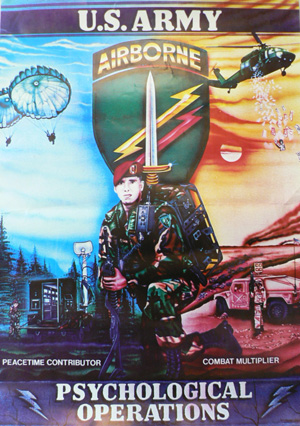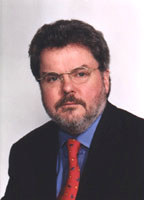Submitted by Laura Miller on
More examples of the Bush administration's manipulation of news spilled out into U.S. newspapers last week. Raising further questions about how the White House continues to spin its "War on Terror," the Los Angeles Times reported on November 30 the U.S. military "is secretly paying Iraqi newspapers to publish stories written by American troops in an effort to burnish the image of the U.S. mission in Iraq. The articles, written by U.S. military 'information operations' troops, are translated into Arabic and placed in Baghdad newspapers." The stories promoted the efforts of U.S. and Iraqi troops and denounced terrorists.
 The Times' Mark Mazzetti and Borzou Daragahi wrote, "Records and interviews indicate that the U.S. has paid Iraqi newspapers to run dozens of such articles, with headlines such as 'Iraqis Insist on Living Despite Terrorism,' since the effort began this year." The Pentagon hired the Lincoln Group to translate and place the stories, in an effort "to mask any connection with the U.S. military," the Times wrote. The Times article got the attention of reporters in Washington, who brought it up at press briefings at the White House, State Department and Pentagon, where official spokesmen insisted that they needed more facts before they could respond to journalists' questions.
The Times' Mark Mazzetti and Borzou Daragahi wrote, "Records and interviews indicate that the U.S. has paid Iraqi newspapers to run dozens of such articles, with headlines such as 'Iraqis Insist on Living Despite Terrorism,' since the effort began this year." The Pentagon hired the Lincoln Group to translate and place the stories, in an effort "to mask any connection with the U.S. military," the Times wrote. The Times article got the attention of reporters in Washington, who brought it up at press briefings at the White House, State Department and Pentagon, where official spokesmen insisted that they needed more facts before they could respond to journalists' questions.
On December 1, Knight-Ridder reported the military's priorities in Iraq had skewed away from truth telling and towards propagandizing. "[P]ublic affairs staff at the American-run multinational headquarters in Baghdad have been combined with information operations experts in an organization known as the Information Operations Task Force. The unit's public affairs officers are subservient to the information operations experts, military and defense officials said. The result is a 'fuzzing up' of what's supposed to be a strict division between public affairs, which provides factual information about U.S. military operations, and information operations, which can use propaganda and doctored or false information to influence enemy actions, perceptions and behavior," Jonathan S. Landay wrote.
Concerns about covert propaganda efforts in Iraq and possible blowback were raised by journalists and by politicians from both the Republican and Democratic parties. Two days after the LA Times story broke, the Pentagon provided a briefing to Senator John Warner (R-Va.), the chair of the Senate Armed Services Committee. "Well, seriously, there's so many questions that are unanswered," he told reporters after the meeting. "So much more has got to be brought forth and assessed by myself, as just one member of Congress, and others, until we can reach any conclusions as to what the serious problem is and so forth." Other than saying that the Pentagon intended to investigate further, Warner offered few details about the Pentagon's classified public affairs contracts:
QUESTION: Senator, if the work of the Lincoln Group is to get out this information, get out the facts, why was the operation classified? Or is there a...
WARNER: Because of some of the material that they have to deal with.
QUESTION: What kind of material?
WARNER: We did not get into those specifics. I will eventually get into it and try and ascertain the reason for classification, but much of the work is classified. And I have to sort of skip around between what was briefed classified and unclassified.
QUESTION: Senator, it's a little hard for journalists to understand why getting out truthful facts is a classified mission that you can't tell us about.
WARNER: And that's the ultimate question you've got to answer. And at this moment I can't give you any facts to help you on that.
A PR Firm for 'Hostile Environments'
 Founded in 1999, the Lincoln Group is a relative newcomer to the world of defense contractors. In October 2004 under the name of Iraqex, the firm won a $6 million PR contract from the U.S.-led Multi-National Corps-Iraq to design and execute an "aggressive advertising and public relations campaign that will accurately inform the Iraqi people of the coalition's goals and gain their support," journalist Jason Vest reported. In November, the trade publication O'Dwyer's PR Daily reported that Iraqex was seeking interns to go to Iraq. Their duties would include "monitoring of Iraqi media, development of press releases and media material, interaction with Iraqi media for information requests and to pitch stories, and support for media events." Iraqex, however, was reluctant to talk to the media about itself or its work in Iraq, turning away journalists' questions.
Founded in 1999, the Lincoln Group is a relative newcomer to the world of defense contractors. In October 2004 under the name of Iraqex, the firm won a $6 million PR contract from the U.S.-led Multi-National Corps-Iraq to design and execute an "aggressive advertising and public relations campaign that will accurately inform the Iraqi people of the coalition's goals and gain their support," journalist Jason Vest reported. In November, the trade publication O'Dwyer's PR Daily reported that Iraqex was seeking interns to go to Iraq. Their duties would include "monitoring of Iraqi media, development of press releases and media material, interaction with Iraqi media for information requests and to pitch stories, and support for media events." Iraqex, however, was reluctant to talk to the media about itself or its work in Iraq, turning away journalists' questions.
In June 2005, the Washington Post reported that the Pentagon had just awarded three contracts, worth up to $300 million over five years, to three companies -- the Lincoln Group and long-time defense contractors SYColeman, Inc. and Science Applications International Corporation. The companies were to "inject more creativity into its psychological operations efforts to improve foreign public opinion about the United States, particularly the military," according to the Post.
The Lincoln Group, which claims 250 employees worldwide, describes itself as a "strategic communications and public relations firm providing insight and influence in challenging and hostile environments." In response to the LA Times story, the firm issued a press release stressing "truthful reporting." The brief statement explains:
Our priority has always been, and continues to be, accuracy and timeliness. Our clients, our employees and the Iraqis who support this effort have maintained a commitment to battle terror with a powerful weapon -- the truth.
We counter the lies, intimidation, and pure evil of terror with factual stories that highlight the heroism and sacrifice of the Iraqi people and their struggle for freedom and security. We are encouraged by their sacrifice and proud to help them tell their side of the story.
Reporting for GovExec.com in early December 2005, Vest examined the Pentagon's use of outside contractors. He talked to Professor Philip M. Taylor of England's University of Leeds, an expert on psychological operations and propaganda and a consultant to the American and British governments, about the private PR contracts. Taylor said, "Outsourcing is either a sign of recognition that the military is not terribly good at certain types of persuasion, or a way of distancing the U.S. government from the messages. If that company then does something which is controversial, the government can say, 'Sorry, it wasn't us, but we'll fire the company that did this supposedly in our name.'"
Military PSYOPS
"PSYOPS, as the military calls it, seek to exploit human vulnerabilities in enemy governments, militaries and populations to pursue national and battlefield objectives," William Arkin wrote for the Washington Post in 1999. "To some, PSYOPS is a backwater military discipline of leaflet dropping and radio propaganda. To a growing group of information war technologists, it is the nexus of fantasy and reality. Being able to manufacture convincing audio or video, they say, might be the difference in a successful military operation or coup."
Military accounts of recent PYSOPS work in Iraq have fallen mostly on the benign side of the scale. A recent video news release produced by the Army & Air Force Hometown News Service explained PYSOPS work in Baghdad in simple cheerleader terms: "These US troops are preparing for a different kind of mission. They're getting ready to arm Iraqis with information. Using different media formats, psychological operations spreads messages about everything from safety issues to coalition activity." The story focuses on the distribution of the PYSOPS produced free newspaper Baghdad Now.
 Baghdad Now has been the subject of a handful of military "news" stories, but descriptions of the paper vary. It was published either monthly or bi-monthly, with a circulation reported in one story as 70,000, and in another as 750,000. A February 2004 DefendAmerica News report described the paper as "written in Arabic and English by Iraqi journalists and also [containing] news from the neighborhoods' military leaders."
Baghdad Now has been the subject of a handful of military "news" stories, but descriptions of the paper vary. It was published either monthly or bi-monthly, with a circulation reported in one story as 70,000, and in another as 750,000. A February 2004 DefendAmerica News report described the paper as "written in Arabic and English by Iraqi journalists and also [containing] news from the neighborhoods' military leaders."
A DefendAmerica News story from March 2004 reported that the 1st Brigade, 1st Armored Division Fire Support Element unit was responsible for delivering "Baghdad Now, a community newspaper produced for the residents of Baghdad, working with the Division Public Affairs Section to determine public reaction to the media and assisting reporters." The story explained that the unit goes "into the community with civil affairs teams, analyze data with counterintelligence specialists to determine a community's mood and provide force protection for the forward operating base and for convoys. 'We've added a whole new level to our arsenal,' said Sgt. 1st Class Darrin M. Domko, brigade fire support sergeant. Instead of their traditional weapons, these artillerymen use word processors and fight on the information battlefield. 'Now we can write articles for the local papers,' Domko said."
According to the military stories written about Baghdad Now, distribution of the paper by PSYOPS forces was an important aspect of the paper. "Distributing the paper creates an effective medium for communication, opening many doors previously closed to the soldiers, [361st Psychological Operations Company] members said. According to [Staff Sgt. Richard K.] Wilson, handing out newspapers gives the soldiers 'instant access' to the community," DefenseLINK News reported in their December 2003 story titled, "Psychological Operations Team Makes Friends Through Newspaper."
When it comes to cloak and dagger information warfare, others pale before the Washington-D.C. based Rendon Group. Going back to at least 9/11, the secretive strategic communications firm headed by former Democratic operative John Rendon has been the Pentagon's top choice for its juiciest classified operations. In a rare interview, Rendon "openly boasted" to journalist James Bamford of "the sweep and importance of his firm's efforts as a for-profit spy." Rendon is at the shadowy center of the Iraq war, marketing a "clandestine operation -- part espionage, part PR campaign -- that had been set up and funded by the CIA and the Pentagon for the express purpose of selling the world a war," Bamford wrote for Rolling Stone.
Little is known about Rendon's current work for the Pentagon. The Center for Media and Democracy has written several articles on other campaigns by Rendon, most associated with U.S. military activities going back to the 1989 invasion of Panama. However, Rendon's role in the current invasion of Iraq, although little noted, cannot be understated. As the dust settled following 1991's Operation Desert Storm, the Rendon Group -- working on the CIA's tab -- created the Iraqi National Congress and paved the road to Capitol Hill and the White House for its leader Ahmed Chalabi. The INC and Chalabi are now recognized as the source of much of the faulty intelligence used by the Bush administration to justify the March 2003 Iraq invasion. Congress has never investigated Rendon's role in the manufacturing of false intelligence on Iraq.
Bamford's Rolling Stone exposé, like the LA Times' reporting on the Lincoln Group, has pulled pieces of White House and Defense Department deception out of darkness, illustrating the scope of the Bush administration's duplicity on Iraq and the "War on Terror" and filling the void of Congressional oversight.
'Victory' for the White House
As the LA Times was reporting on the Lincoln Group's media manipulation, George W. Bush was announcing to cadets at the U.S. Naval Academy the latest repackaging of the bloody mess in Iraq -- the pollster-vetted "Strategy for Victory in Iraq."
 Using the now-familiar White House rhetorical technique of simple repetition to get its message across, The New York Times reported Bush "used the word victory 15 times in the address; 'Plan for Victory' signs crowded the podium he spoke on; and the word heavily peppered the accompanying 35-page National Security Council document titled, 'Our National Strategy for Victory in Iraq.'" According to the Times, the speech's "relentless focus on the theme of victory strongly reflected a new voice in the administration: Peter D. Feaver, a Duke University political scientist who joined the N.S.C. staff as a special adviser in June and has closely studied public opinion on the war."
Using the now-familiar White House rhetorical technique of simple repetition to get its message across, The New York Times reported Bush "used the word victory 15 times in the address; 'Plan for Victory' signs crowded the podium he spoke on; and the word heavily peppered the accompanying 35-page National Security Council document titled, 'Our National Strategy for Victory in Iraq.'" According to the Times, the speech's "relentless focus on the theme of victory strongly reflected a new voice in the administration: Peter D. Feaver, a Duke University political scientist who joined the N.S.C. staff as a special adviser in June and has closely studied public opinion on the war."
But unlike earlier media campaigns, the attempt to spin away Americans' sinking feelings towards the President and the war may not bear fruit. White House propagandists appear increasingly blinded by their own delusions, so out of touch with the grim realities in Iraq and Afghanistan -- not to mention U.S. communities -- that their ability to construct new propaganda is weakened.
White House spokesman Scott McClellan appeared uncomfortable when presented with a description of the Iraq situation that fell outside his own well-rehearsed spin, even though it was written into the President's "Victory" address.
Q -- when you guys frame this, as you just did, it's always about the war on terror. But by the President's own account in his speech on Wednesday, the jihadists are the smallest of the three elements which are fighting U.S. forces in Iraq.
MR. McCLELLAN: What did he say about the jihadists?
Q You know what he said about the jihadists.
MR. McCLELLAN: He said, the smallest, but most lethal.
Q Well, yes, but you frame it as a war on terror, and it's about much more than that, as he, himself, said.
MR. McCLELLAN: It is about the war on terrorism. It's about much more than Iraq.
Q It's about the rejection of the power that was held by the Sunni minority, it's about rejection of foreign presence in the country. It's about a lot of things in addition to the jihadists.
MR. McCLELLAN: It's about the broader war on terrorism, is what it's about, Bill. And maybe you have a different understanding about it, but the President understands clearly the stakes that are involved in this broader war on terrorism. That's why he takes a comprehensive view of how we succeed in this war on terrorism. And that's why he's taken the fight to the enemy. That's why he's supporting efforts to expand freedom and democracy in the heart of a dangerous region of the world. And we will continue to act. We will continue to support those who want to live in freedom. And Iraq will inspire the rest of the Middle East and help us lay the foundations of peace that I've been talking about.
Tomlinson's Broadcasting Board of Governors
"In a perfect world, there would be no need for Alhurra in the countries we serve because they would have a free press and media that served the cause of advancing a positive, modern vision for democracy, peace, and prosperity in the region. But indigenous media in the Middle East, regardless of their popularity, are not now uniformly and consistently serving these purposes. Alhurra and [Radio] Sawa do," Alhurra head Moucafac Harb explained to the Subcommittee on Oversight and Investigations of the House Committee on International Relations, which was looking into questions regarding the U.S.-funded TV network's procurement and hiring practices.
 The most public of U.S. created media currently beamed into Iraq and the larger Arabic speaking region are Alhurra, an Arabic language satellite TV network, and Radio Sawa, a 24-hour radio service that broadcasts Arabic and Western pop music and news headlines. Both are projects of the Broadcasting Board of Governors, which also oversees Voice of America, Radio Free Europe/Radio Liberty, Radio Free Asia, Radio and TV Martí, and Radio Farda. The BBG is the independent federal agency in charge of "U.S. government and government sponsored, non-military, international broadcasting."
The most public of U.S. created media currently beamed into Iraq and the larger Arabic speaking region are Alhurra, an Arabic language satellite TV network, and Radio Sawa, a 24-hour radio service that broadcasts Arabic and Western pop music and news headlines. Both are projects of the Broadcasting Board of Governors, which also oversees Voice of America, Radio Free Europe/Radio Liberty, Radio Free Asia, Radio and TV Martí, and Radio Farda. The BBG is the independent federal agency in charge of "U.S. government and government sponsored, non-military, international broadcasting."
However, BBG's independence is now being called into question. The agency is headed by none other than Kenneth Tomlinson, the controversial former head of the Corporation for Public Broadcasting, who has been charged with injecting his strong Republican bias into the federally funded agencies that he chaired. The CPB was created to insulate public broadcasting from political interference. Tomlinson was recently cited for using "political tests" as a criteria for recruiting a new President/CEO for CPB. The Nation's Eric Alterman credits CPB's inspector general with exposing Tomlinson for "receiving advice and possibly instructions directly from the top -- (acting President) Karl Rove."
Questions are piling up concerning the BBG under Tomlinson's leadership. The public broadcasting trade publication Current reported in November 2005, "Tomlinson is also under investigation by the State Department Inspector General's Office for what he's done as chairman of the Broadcasting Board of Governors. Meanwhile, two other agencies overseen by the BBG are embroiled in controversies both public and private. The fledgling Arab-language TV channel Alhurra is the subject of three separate government investigations (by the State Department, a House International Relations subcommittee and the Government Accountability Office). And journalists at Voice of America are assailing their BBG-appointed boss for trying to tilt news stories more favorably toward the Bush administration."
Can Alhurra and Voice of America employees confidently report negative stories on the Bush administration under Tomlinson's partisan watch? When does "news" become "public affairs" and when does that become "deceptive propaganda"? The fog of influence and impropriety that swirls around Tomlinson and the BBG runs contrary to what he describes as the agency's mission -- "to ensure and safeguard the integrity, quality, and effectiveness of our international broadcasters."
 At the November 10 House International Relations subcommittee hearing, Tomlinson told an Alhurra success story. "And here's how one Arabic-language newspaper -- Al Quds Al Arabi, by no means friendly to the United States -- described Alhurra's coverage of the elections in Egypt: 'Alhurra television emerged like a black stallion in this satellite competition, since it was able to attract normal viewers and activists alike thanks to its wide range of guests from the opposition who are not fearful of criticizing the Mubarak regime, as well as Mubarak and his family specifically, while viewers showed disinterest in Aljazeera's coverage.' The article's headline: 'Admiring Alhurra's Egyptian Elections Coverage; Their newscasts have become like family in the Egyptian news environment,'" Tomlinson testified.
At the November 10 House International Relations subcommittee hearing, Tomlinson told an Alhurra success story. "And here's how one Arabic-language newspaper -- Al Quds Al Arabi, by no means friendly to the United States -- described Alhurra's coverage of the elections in Egypt: 'Alhurra television emerged like a black stallion in this satellite competition, since it was able to attract normal viewers and activists alike thanks to its wide range of guests from the opposition who are not fearful of criticizing the Mubarak regime, as well as Mubarak and his family specifically, while viewers showed disinterest in Aljazeera's coverage.' The article's headline: 'Admiring Alhurra's Egyptian Elections Coverage; Their newscasts have become like family in the Egyptian news environment,'" Tomlinson testified.
Given what is being revealed now about information operations in Iraq, Tomlinson's quoting of an Arabic news story invites further questions: Who wrote that story? Did the author have a relationship with the U.S. government or military?
The potential for propaganda blowback in this information age is a given. But if reported successes in the Middle East are themselves the products of U.S. psychological operations in the region, the only "victories" the American public sees may be nothing more than the victory of spin. U.S. citizens need to face these critical questions: What kind of democracy exists in a manipulated media environment? And where does it leave U.S. credibility in the eyes of the world?
